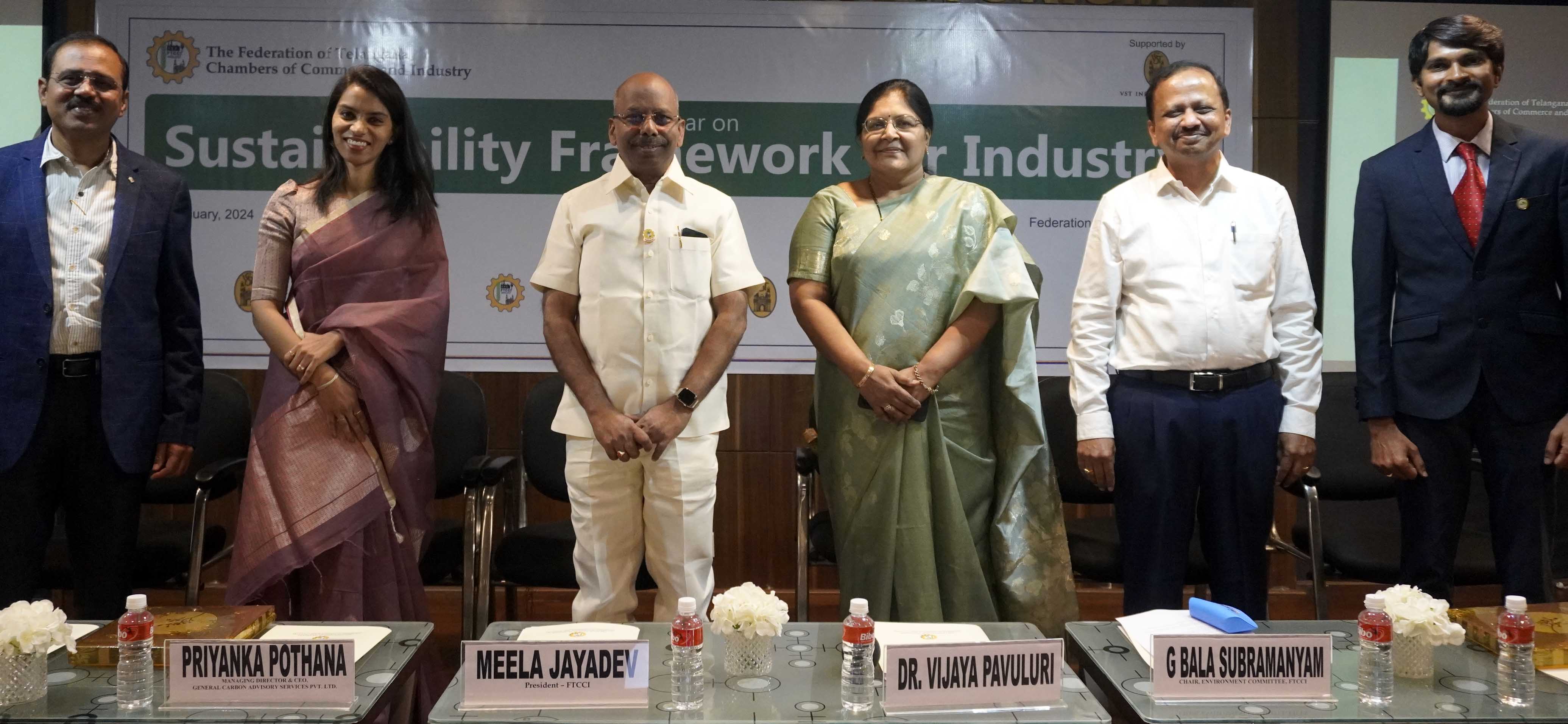Hyderabad, January 30, 2024......Sustainability reporting is the disclosure and communication of environmental, social, and governance (ESG) goals—as well as a company's progress towards them. It should not be treated just as routine work, tick marked as done. It should have a success story and continuous progress must be reported said G. Bala Subramanyam, Chairman of the Environment Committee of FTCCI while making a presentation on Sustainability Context Setting immediately after opening a day-long seminar on 'Sustainability Framework for Industry'
Formerly Advisor to ASCI and Joint Chief Environmental Engineering, Andhra Pradesh Pollution Control Board, said “I used to think of sustainability as a buzzword at the beginning of my career. But it is no longer the buzzword, instead, it is the need of the hour. Sustainable is that word that meets the needs of the present without compromising the ability of future generations to meet their own needs. It is much more than a buzzword — it's a critical responsibility that organisations can no longer afford to ignore. The essence of sustainability goes beyond merely talking and reporting as a matter of statutory compliance. It is securing the future for future generations”, he said.
He spoke about three pillars of sustainability---People, Profit and Planet, alternatively 3Es--Economic, Environmental and Equity(social). Sustainability is the balance between profit and purpose, he added. He told his participants to see sustainability both as an opportunity and a challenge, G. Bala Subramanyam told 100 plus participants drawn from different disciplines of Environment and Sustainability from various industries in the city. Every department has a role to play in sustainability, he said. He gave successful examples of sustainable practices of CIPLA, Aurobindo Pharma, Dr Reddy's, Piramal and GSK as reported in their annual reports.
Have we ever imagined 20 or 30 years ago that a day would come when the cost of a one-litre water bottle is more than a litre of milk? A water bottle in an airport is charged anywhere upwards of Rs 50/-. Have we ever thought selling bottled water was a profitable business about 30/40 years back? If anybody had told them that he would sell water in a bottle about 40 years back, he would have been ridiculed, he asked.
Towards the end of his presentation, there was a question-and-answer session, where a participant asked Sustainability framework for Industry is fine, but, what about the government, Political Parties and Elections? E is for Environment and E is also for Elections. Now that general elections are around the corner, why don't we promote greener elections, flex-free elections, and pollution-less commuting? Why don't political parties talk extensively about environment-related issues in their manifestos? Bala Subramanyam responded positively and said it was the right time to raise the issue and sensitize people, parties and the election commission
The political parties must prioritize climate change in their manifestos, commented a participant who is an ESG(Environmental, social and governance) professional from a private industry
The two leading national parties BJP and INC, had both climate-related promises. I hope that the issue will play a significant role in the party manifestos in the coming few months, added another participant.
Environmental concerns are particularly important for young voters as they are more environmentally conscious so political parties should be more sensitive towards this in the coming electioneering, opined another participant.
The parties must also highlight in their manifesto the need to focus on the deteriorating soil quality added another participant.
The participants hoped that the coming general elections would be green, where we don't have to see the use of flex and nonbiodegradable materials. Maybe we get to see paper posters as viable alternatives and many such green materials.
Giving his opening remarks, Meela Jayadev, President of FTCCI said in an era where the consequences of our actions on the environment are becoming increasingly apparent, it is crucial for us, as industry leaders and stakeholders, to re-evaluate our practices and adopt a more sustainable approach. Sustainability is not merely a buzzword but a call to action that requires a comprehensive and strategic approach. In this rapidly evolving industrial landscape, sustainability is the cornerstone of success. It is important to discover how your industry can thrive while contributing to a greener, more socially responsible world. As you navigate through various topics during the day, please keep in mind that sustainability is not a choice but a necessity for the well-being of our planet and the longevity of our industries. Let us commit to adopting responsible and sustainable practices that benefit us, our communities, and the generations to come. He thanked FTCCI's partner in this conference VST Industries Ltd for making this event possible. Let us seize this opportunity to shape a future that is not only economically prosperous but also socially equitable and environmentally sustainable.
The day-long seminar had sessions such as GreenCo Rating--India's way forward for sustainability by Ravi Kumar, Counsello9r of Confederation of Indian Industry.
Keerthi D Souza, MD of Life Giver Professional Service LLP spoke on the GRI (Global Reporting Initiative, a set of guidelines that provide a framework for sustainability reporting): Framework on Sustainability Reporting for Industry.
Priyanka Pothana, MD and CEO of General Carbon Advisory Services Pvt. Ltd spoke about the Carbon Disclosure Project (CDP) Reporting and she gave an overview of the same.
Metlapalli Srinivasu made a presentation on EcoVadis and Supply Chain Management--Experience Sharing. Dr. Vijaya Pavuluri discussed Business Responsibility and Sustainability Report (BRSR) Principles and Reporting Requirements.

 et us all join hands to shape a future that is not only economically prosperous but also socially equitable and environmentally sustainable: Meela Jayadev, FTCCI President. ‘Environment’ and 'Sustainability' must be featured in the Election Manifestos of parties in the coming elections: Sustainable professionals.
et us all join hands to shape a future that is not only economically prosperous but also socially equitable and environmentally sustainable: Meela Jayadev, FTCCI President. ‘Environment’ and 'Sustainability' must be featured in the Election Manifestos of parties in the coming elections: Sustainable professionals.










.jpeg)



.jpg)





.jpeg)

.jpg)





.png)

